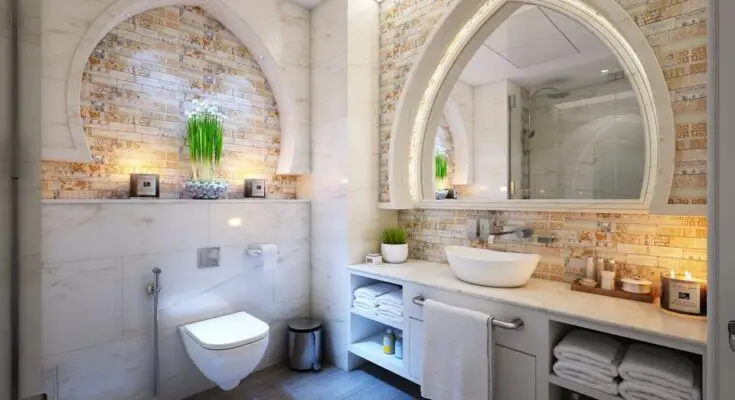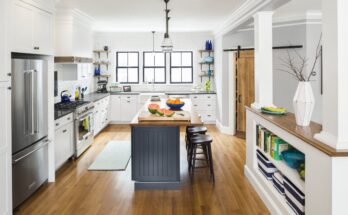Functional home improvements are essential for enhancing the quality of daily life, making living spaces not only more beautiful but also more practical. In Memphis, for instance, while a comprehensive kitchen remodel might set you back $20,000, other smaller-scale enhancements can significantly boost your home’s functionality. Projects ranging from $10,000 to $15,000, for example, updating wall paint, fixing cabinets, upgrading sinks, and installing new tiles, can rejuvenate your kitchen’s aesthetic and utility without a hefty financial burden. These improvements underscore the idea that functional enhancements can be both impactful and cost-effective, contributing to a more enjoyable and efficient home environment.
- Enhancing Bathroom Functionality
The bathroom is a pivotal space in any home, where functionality is just as crucial as style. Upgrading this area can vastly improve daily routines, from streamlining morning preparations to creating a more relaxing ambiance for unwinding in the evening. Consulting with bathroom remodelers in Memphis can provide homeowners with expert insights into the latest trends and technologies in bathroom design. These professionals can offer tailored advice on optimizing bathroom layouts, choosing materials that are both durable and stylish, and selecting fixtures that combine efficiency with luxury, ensuring that every aspect of the bathroom is geared toward enhancing daily life.
Moreover, Memphis bathroom remodelers can assist homeowners in navigating the vast array of available options to find solutions that fit their specific needs and preferences. Whether it’s incorporating smart storage solutions, improving lighting, or installing water-saving fixtures, these experts can help transform a standard bathroom into a personalized retreat that offers both comfort and functionality.
- Intelligent Storage Solutions
Intelligent storage solutions are key to maintaining an organized and functional home. Clutter can significantly hinder a home’s usability, making efficient storage systems essential for a tidy and practical living environment. Homeowners can explore various options such as built-in shelving, multi-purpose furniture, and custom closet systems to maximize storage space and minimize mess. These solutions not only help keep belongings neatly organized but also contribute to a more spacious and welcoming home atmosphere.
Incorporating these smart storage solutions requires thoughtful planning to ensure that they meet the homeowner’s specific needs while complementing the home’s overall design. For instance, built-in shelving can be customized to fit awkward spaces or to display decorative items. At the same time, multi-use furniture like ottomans with storage can provide extra seating as well as a place to stow away items. By carefully selecting and implementing these storage solutions, homeowners can significantly enhance their home’s functionality, making daily living more streamlined and enjoyable.
- Improve Indoor Air Quality
Indoor air quality is a critical component of a functional and healthy home. Poor air quality can lead to a range of health issues, from allergies to respiratory problems, making it imperative for homeowners to consider ways to improve ventilation and purify indoor air. Installing air purifiers, ensuring proper ventilation, and choosing non-toxic materials and finishes can all contribute to cleaner indoor air, creating a healthier living environment for residents.
In addition to mechanical solutions, natural options such as indoor plants can also enhance indoor air quality. Certain plants are known for their air-purifying properties, ability to filter out common contaminants, and ability to improve overall air freshness. Not only do these plants contribute to a healthier indoor environment, but they also add a touch of nature and aesthetic appeal to the home. By prioritizing indoor air quality through a combination of technology and natural solutions, homeowners can create a more comfortable and healthful living space.
- Multi-Purpose Room Conversions
The versatility of a home can be significantly enhanced by converting underused spaces into multi-purpose areas. Spare rooms, basements, or attics can transform into home offices, gyms, or hobby rooms, providing dedicated spaces for activities that improve daily living. This conversion not only maximizes the utility of every square foot but also adapts to the evolving needs of the household, offering flexibility as lifestyles and interests change over time.
When planning a multi-purpose room conversion, consider the activities that will take place and design the space accordingly. For a home office, incorporate ample natural light and ergonomic furniture. For a gym, ensure there’s enough space for equipment and movement. Hobby rooms might need specialized storage or workstations. Thoughtful design, tailored to the specific functions of the room, ensures that these spaces enhance both the home’s functionality and the occupants’ quality of life.
- Upgrading Flooring for Durability and Ease of Maintenance
Flooring plays a pivotal role in the functionality and aesthetics of a home. Choosing the right flooring material can influence the home’s maintenance requirements, durability, and comfort. Durable materials like hardwood, laminate, or tile not only withstand daily wear and tear but also offer ease of cleaning, contributing to a healthier and more maintainable living environment. These materials come in various styles and finishes, allowing homeowners to choose options that complement their home’s decor while enhancing its functionality.
When selecting flooring, consider the room’s purpose and the typical foot traffic. Kitchens and bathrooms benefit from moisture-resistant materials while living areas and bedrooms might prioritize comfort and warmth underfoot. Upgrading flooring is an investment in the home’s value and the occupants’ comfort, creating spaces that are not only beautiful but also practical and durable.
- Implementing Water-Saving Features
Water efficiency is an increasingly important aspect of functional home improvements, offering environmental benefits and cost savings. Installing low-flow fixtures in bathrooms and kitchens, adopting efficient irrigation systems for landscaping, and considering rainwater harvesting are ways to reduce water usage without compromising on convenience or functionality. These features not only contribute to a more sustainable home but also can lead to significant reductions in water bills over time.
In addition to installing water-saving fixtures, homeowners can adopt habits that contribute to water conservation, such as fixing leaks promptly and using water-efficient appliances. Educating household members about the importance of water conservation can further enhance the effectiveness of these improvements. By prioritizing water efficiency, homeowners can ensure their properties are more environmentally friendly, cost-effective, and aligned with contemporary standards for sustainable living.
Conclusion
Functional home improvements are about making strategic upgrades that enhance the livability and efficiency of your space. Whether it’s enhancing bathroom functionality, optimizing storage, improving air quality, converting unused spaces, upgrading flooring, or implementing water-saving measures, each improvement contributes to a more functional and enjoyable home. These upgrades not only enhance daily life but also add value to the property, demonstrating that thoughtful investments in your home can yield significant returns in comfort, utility, and sustainability.



